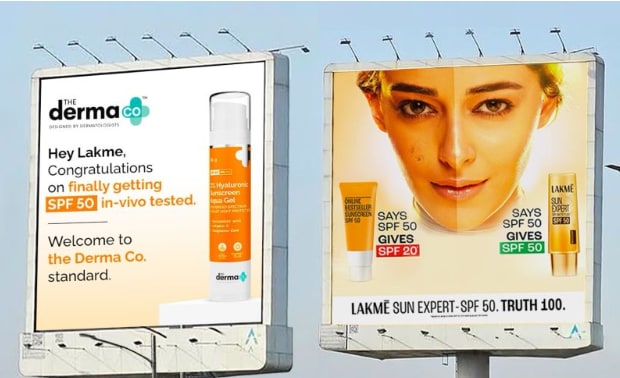Mamaearth-Lakmé faceoff: Skincare brand wars heat up, HUL responds
Such competitive jabs are not unprecedented in the marketplace. In 2021, German brand Sebamed famously launched an ad campaign targeting HUL’s Dove, igniting a public debate over pH levels in personal care products.
ADVERTISEMENT
A new brand rivalry has emerged under the harsh glare of the sun. Hindustan Unilever’s Lakmé and Honasa Consumer’s Mamaearth have found themselves at the center of a growing dispute over sunscreen efficacy - and allegations of brand mimicry.
The feud was ignited when Lakmé unveiled a new advertising campaign touting its SPF 50 sunscreen product, the Lakmé Sun Expert. In the campaign, the brand introduced what it termed an “SPF Lie Detector Test,” a dramatized method suggesting that certain “online bestseller” sunscreens on the market vastly overstated their sun protection claims. Though the campaign stopped short of naming its competitors, it featured two unbranded sunscreen bottles that closely resembled products from Mamaearth’s The Derma Co. and Dot & Key, a brand under Nykaa.
According to Lakmé, the ad was informed by in vivo testing - a globally recognized gold standard in sunscreen efficacy - conducted at an independent, accredited laboratory. The company asserted that while its product met the claimed SPF 50 standard, others fell significantly short, delivering as little as SPF 20.
The implications of such underperformance are not cosmetic alone. SPF, or Sun Protection Factor, is a key indicator of a sunscreen’s ability to shield skin from harmful ultraviolet rays, and misleading labeling could pose genuine health risks, including skin aging, pigmentation, and increased cancer susceptibility.
Sunscreen showdown: Honasa's Ghazal Alagh takes a jab at HUL-owned Lakmé
The response from Mamaearth was swift. Ghazal Alagh, co-founder of Honasa Consumer, issued a public rebuttal on social media accusing Lakmé and its parent company, HUL, of product imitation. In a now-deleted social media post, Alagh alleged that Lakmé had copied not only Mamaearth’s sunscreen but also other products, including its vitamin C face wash and onion shampoo—claims she backed with comparative images and launch timelines under the headline “OG versus Copy.”
“Indian FMCG has lacked good competition for a long time,” Alagh wrote in another post that remains online. “We take pride in the fact that we have been challenging these norms and waking up these brands time and again.”
Marketing observers have taken note. “Even though the one spending marketing money is Lakmé, online buzz may ultimately benefit Mamaearth,” said brand expert Karthik Srinivasan, who called Alagh’s response “clever.” He noted that Lakmé’s campaign, featuring actress Ananya Panday, may inadvertently draw more attention to the rival brand due to speculation and discussion surrounding the ad.
Meanwhile, Nykaa, whose Dot & Key sunscreen was also seemingly implicated in Lakmé’s campaign, has yet to publicly respond.
Such competitive jabs are not unprecedented in the marketplace. In 2021, German brand Sebamed famously launched an ad campaign targeting HUL’s Dove, igniting a public debate over pH levels in personal care products.
Industry veteran Sandeep Goyal, founder of advertising firm Rediffusion, likened the current spat to earlier brand dust-ups. “These are attention-grabbing tactics that don’t require massive marketing budgets,” he said. “Eventually, the noise fades, but for a time, it puts a spotlight on the challenger.”
Read More: Delhi HC flags HUL’s Lakmé Ad as disparaging in Mamaearth lawsuit
In an exclusive statement to Storyboard18, HUL maintained that its sunscreen claims are rigorously substantiated. “Since 2015, we’ve conducted in vivo SPF testing across our sun portfolio,” a company spokesperson said. They maintain that several brands in the market, some of them best-sellers, have been "falsely claiming SPF 50".
"In the interest of consumers, upon independent testing by accredited labs, they fall far short of stated claims. This would amount to misleading consumers about sunscreen, which has skin implications like pigmentation, skin ageing, and spots. Indian consumers must have access to sunscreens they can trust," HUL spokesperson added.
Not everyone is convinced by Alagh’s accusations of imitation. Harish Bijoor, brand consultant and founder of Harish Bijoor Consults Inc., called the plagiarism claim “a bit much and a bit rich.”
“HUL is a veritable laboratory of skincare,” Bijoor said. “For every product that reaches the shelf, dozens of variations have likely been tested and discarded.”
Read More: Honasa Consumer takes HUL to Delhi HC, seeks removal of Lakmé sunscreen Ad
For now, the sunscreen skirmish remains unresolved - but one thing is clear: in the booming beauty sector, the competition for consumer trust is heating up.


